When foreign investors are considering expanding their businesses or investing in South Korea, understanding the taxes for foreign investors in Korea is essential. While navigating South Korea’s tax system can be complex, gaining the right knowledge helps investors make informed decisions and avoid unnecessary financial setbacks. This article breaks down the key taxes foreign investors should be aware of when investing in Korea, categorized into national and local taxes.
Summary
- 1. Understanding the Tax System for Foreign Investors in Korea
- 2. National Taxes for Foreign Investors in Korea
- 3. Local Taxes for Foreign Investors in Korea
- 4. Special Tax Exemptions and Incentives for Foreign Investors
- 5. Conclusion: Navigating the Taxes for Foreign Investors in Korea
- 6. About NYLA – Korean Legal Office
1. Understanding the Tax System for Foreign Investors in Korea
South Korea’s tax system is divided into national taxes and local taxes, each with its own regulations and rates. These taxes can impact foreign investors differently based on the type of business activity. In this section, we will explore the major taxes for foreign investors in Korea, starting with the national taxes that every investor should understand.
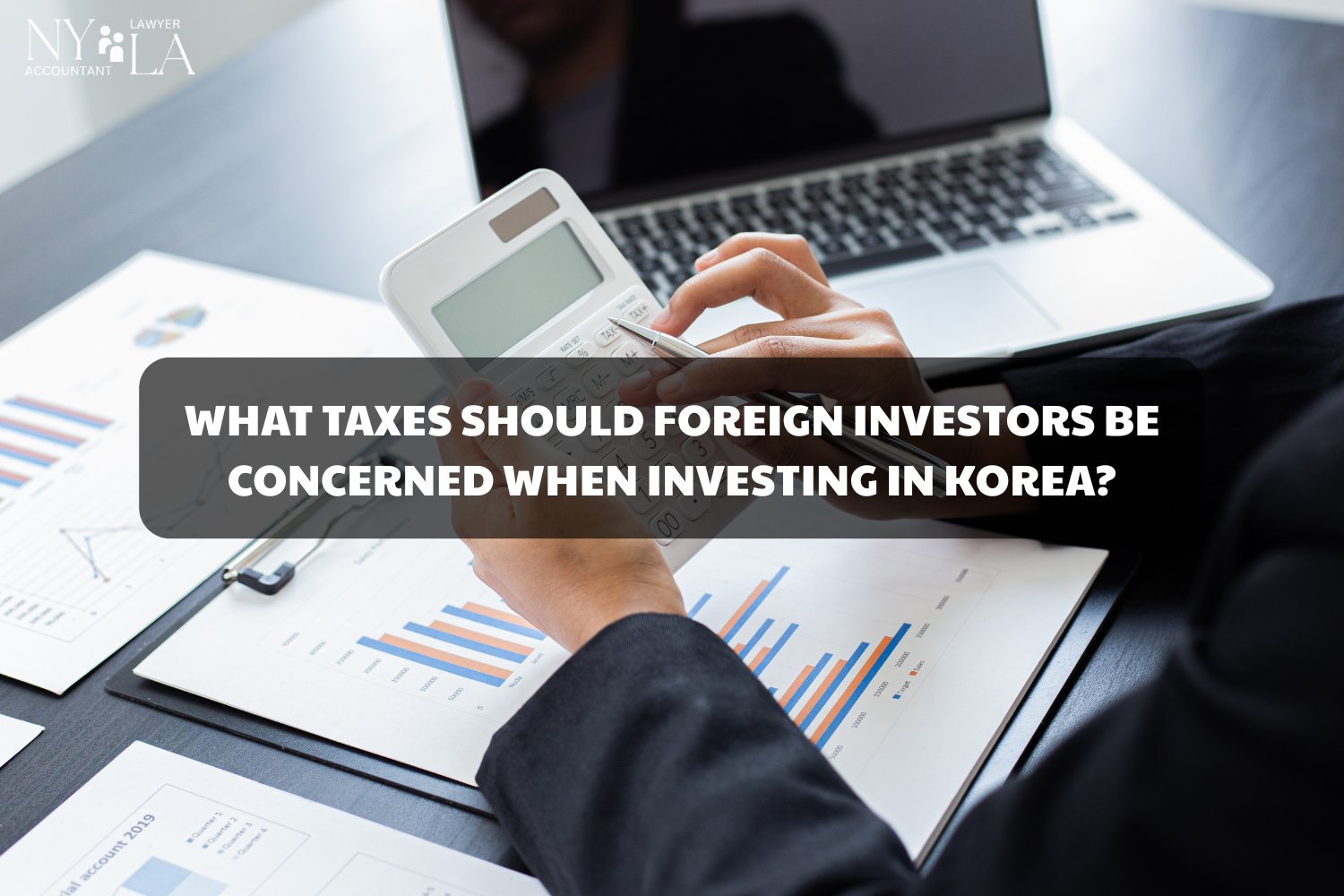
2. National Taxes for Foreign Investors in Korea
National taxes in Korea are categorized into internal taxes and tariffs. These taxes apply to both domestic and foreign businesses. The following are the main taxes for foreign investors in Korea.
Corporate Tax in Korea
One of the most important taxes for foreign investors in Korea is corporate tax. Foreign companies operating in Korea must pay corporate tax on their income, which includes earnings from business operations, liquidations, and capital gains from the transfer of assets, such as land or property. The corporate tax rate is progressive, meaning that the tax rate increases with higher levels of taxable income.
- Corporate Tax Rates: Corporate tax rates in Korea range from 10% to 22%, depending on the amount of taxable income. This is an essential tax for foreign investors in Korea to consider, as it will affect the overall profitability of their investment.
Value-Added Tax (VAT) in Korea
Another key tax for foreign investors is the Value-Added Tax (VAT). VAT is imposed on goods and services that are manufactured, provided, or imported into Korea. If your investment involves producing or selling goods and services in Korea, it is crucial to understand the VAT system.
- VAT Rates: In Korea, the standard VAT rate is 10% on domestic sales. However, exports of goods and services are exempt from VAT, which is beneficial for foreign investors who engage in cross-border trade. The tax for foreign investors in Korea may vary depending on the type of business they operate.
Income Tax on Wages and Salaries for Foreign Workers
For foreign investors who plan to hire employees in Korea, it’s important to consider the income tax imposed on wages and salaries. This tax is applicable to all individuals working in Korea, whether they are domestic or foreign workers. The income tax rate is progressive, meaning it depends on how much the employee earns.
- Income Tax Rates: The income tax for foreign workers is based on a sliding scale from 6% to 42%, depending on the salary level. Foreign investors should account for this tax when hiring employees in Korea as it will impact operational costs.
Capital Gains Tax for Foreign Investors
Capital gains tax is another tax that foreign investors need to be aware of, particularly if they are purchasing assets such as real estate, stocks, or bonds in Korea. This tax is levied on profits made from the sale or exchange of these assets.
- Capital Gains Tax Rates: The rate of capital gains tax in Korea depends on the type of asset being sold. For instance, stock sales can be taxed up to 30%, while real estate may have different tax rates. Understanding these taxes for foreign investors in Korea will allow investors to plan their sales strategies accordingly.
Security Transaction Tax
Investors involved in trading stocks or securities in Korea should be aware of the security transaction tax, which is imposed on the transfer of stocks. This tax is calculated based on the value of the securities at the time of the transaction.
- Security Transaction Tax Rate: The security transaction tax is set at 0.45% of the total value of the securities being transferred. This is an important tax for foreign investors in Korea who plan to participate in the stock market.
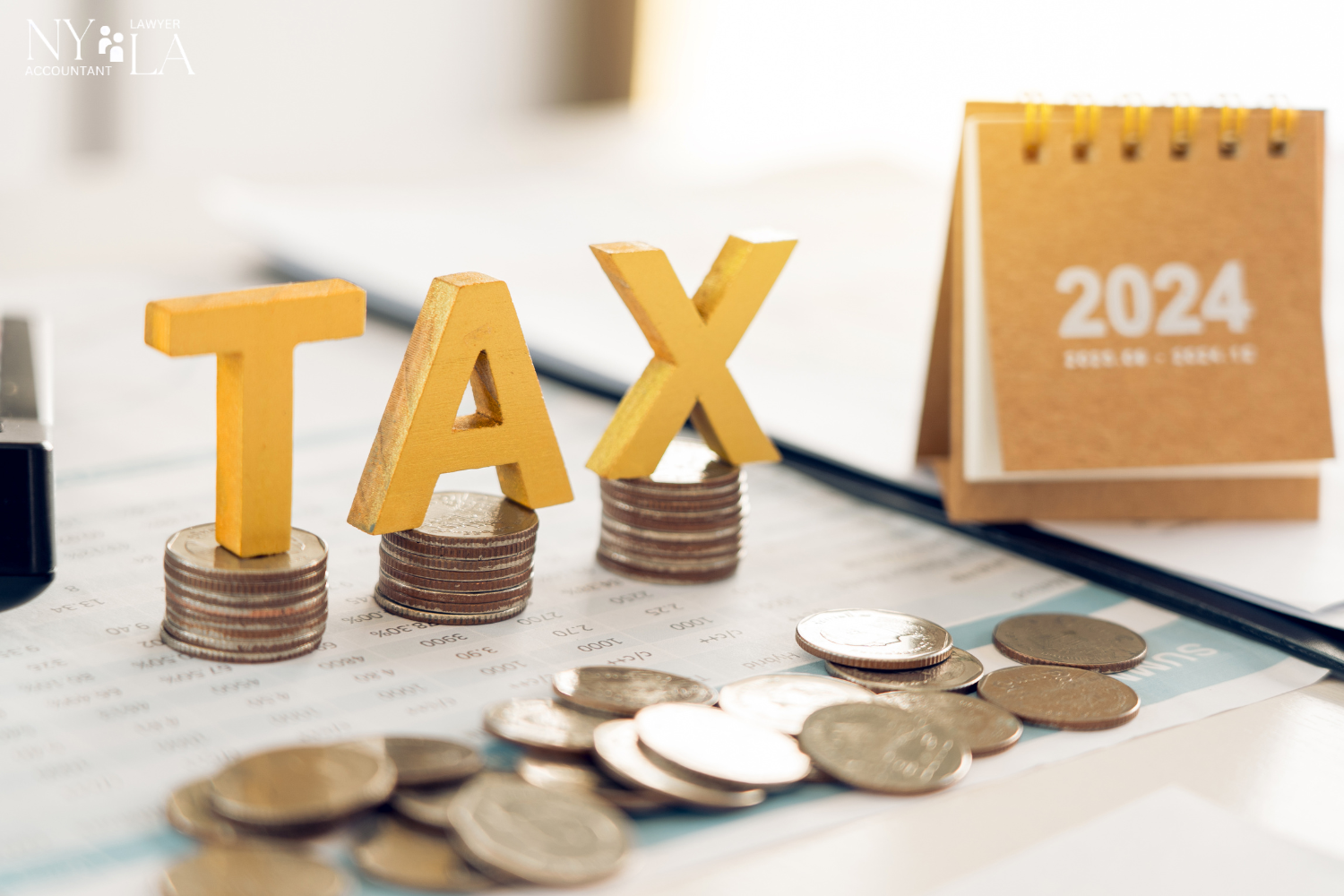
3. Local Taxes for Foreign Investors in Korea
In addition to the national taxes, foreign investors must also take into account the local taxes levied by local governments in Korea. These taxes vary depending on the region and the type of investment. Below are some of the primary local taxes that foreign investors should be aware of.
Acquisition Tax
Acquisition tax is applied when foreign investors purchase real estate, vehicles, or other valuable assets in Korea. This tax is calculated based on the purchase price or the declared value of the property.
- Acquisition Tax Rates: For real estate, the acquisition tax is typically 1% for properties valued at 600 million KRW or less. The rate can increase for higher-value properties. This tax for foreign investors in Korea is an important consideration for those looking to purchase property in the country.
Property Tax
Property tax is levied on land, buildings, and other types of property, including aircraft and ships. The tax is calculated based on the current market value of the property and the applicable tax rate.
- Property Tax Rates: Property tax rates vary depending on the type of property. For example, residential properties may have a different rate compared to commercial properties. Foreign investors should factor in this tax for foreign investors in Korea when considering property investments.
4. Special Tax Exemptions and Incentives for Foreign Investors
The South Korean government offers several incentives to attract foreign investment. These incentives may include tax reductions or exemptions for foreign investors who meet certain criteria.
- Tax Exemptions and Reductions: Foreign investors in Korea can benefit from tax exemptions or reductions if their investments align with the country’s strategic development goals, such as in technology or renewable energy sectors. These tax incentives are designed to make it easier for foreign investors to do business in Korea and to foster economic growth.
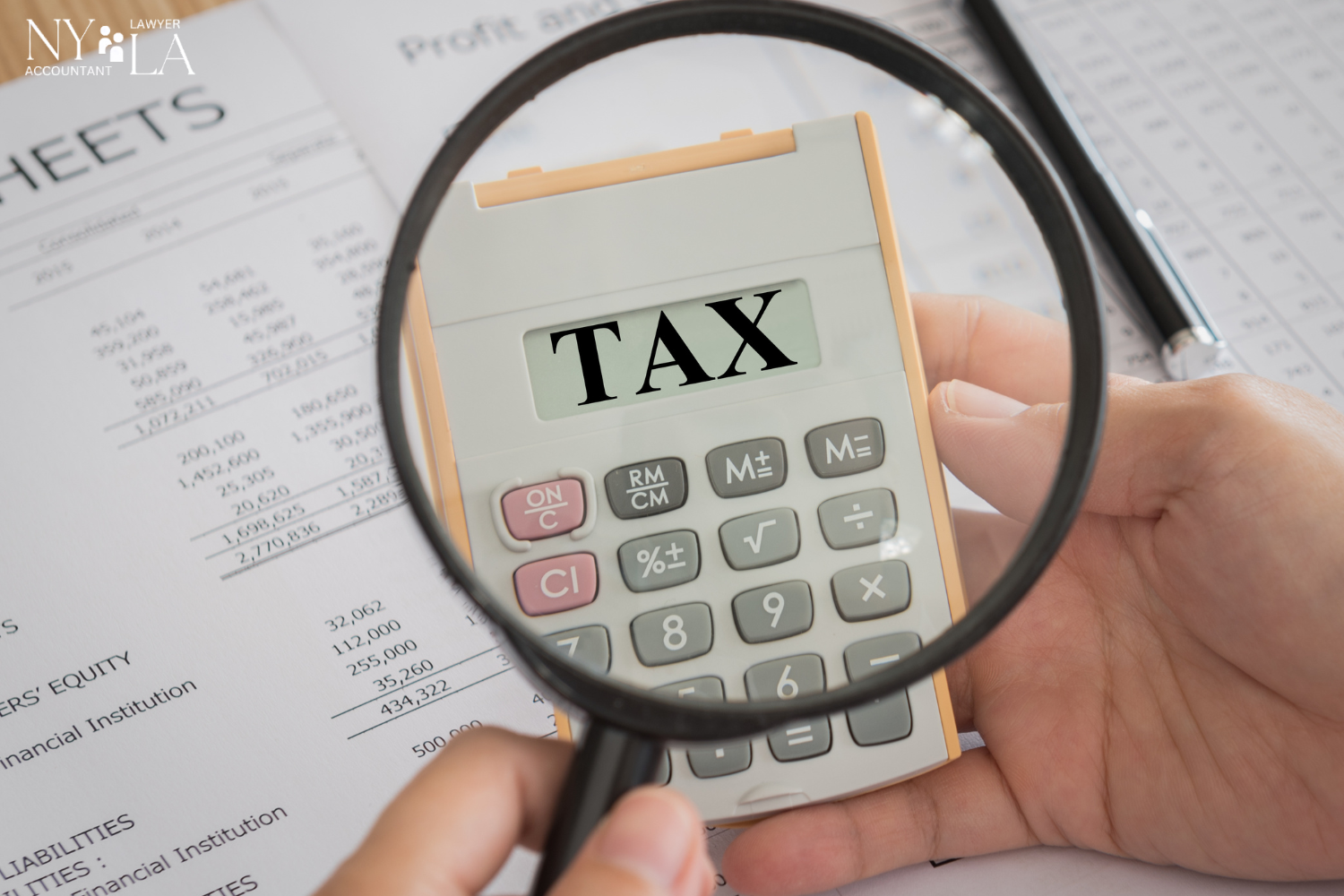
In conclusion, understanding the taxes for foreign investors in Korea is essential for anyone considering investment in the country. From corporate tax to VAT, income tax, capital gains tax, and local taxes, the South Korean tax system presents both challenges and opportunities. By gaining a clear understanding of the various taxes and taking advantage of available tax incentives, foreign investors can maximize the potential for their investment in Korea.
Before making any investment decisions, it is advisable to consult with a local tax expert or legal advisor who can provide guidance on the specifics of taxes for foreign investors in Korea. This will ensure compliance with local laws and regulations and help investors make the most of their ventures in the Korean market.
6. About NYLA – Korean Legal Office
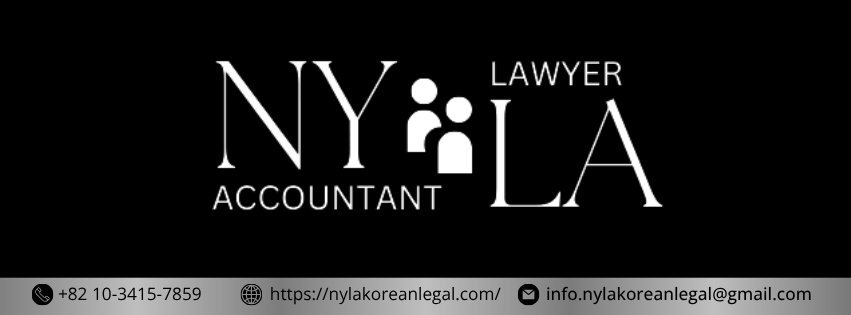
■ NYLA – Your Trusted Legal Partner in Korea
At NYLA, we understand that the success of foreign businesses in Korea requires not only a solid business strategy but also reliable legal support. With a team of experienced Korean attorneys and legal professionals, NYLA provides tailored legal services for companies, investors, and individuals operating or planning to establish a presence in Korea.
We support our clients throughout the entire business journey with comprehensive services, including:
- Legal consultation on company establishment, taxation, and immigration;
- Advice on commercial real estate, franchising, and product distribution;
- Support in human resources, marketing, and business strategy.
In addition to legal advisory, NYLA also represents clients in civil litigation cases related to business, labor, marriage, family, and inheritance to ensure their rights and interests are fully protected.
■ Contact NYLA
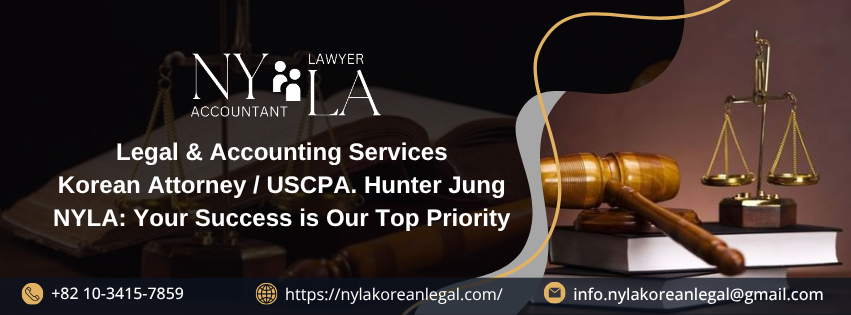
If you’re a foreign business or individual looking for a reliable legal partner in Korea, NYLA is here to help. We are committed to delivering effective, practical, and personalized legal solutions for every client.
With a proven track record of assisting hundreds of international clients, our team is equipped to help you navigate complex legal challenges—whether it’s commercial disputes, contract issues, or foreign investment guidance.
Don’t let legal matters hold you back. Let NYLA be your trusted guide in the Korean market.
■ Get in touch with NYLA for expert legal support
| Website: https://nylakoreanlegal.com/
FB: https://www.facebook.com/nyla.koreanlegal Tiktok: https://www.tiktok.com/@nylakoreanlegal Youtube: https://www.youtube.com/@NYLA-xd8qx Email: info.NYLAkoreanlegal@gmail.com SĐT: +82 10-3415-7859 |
 |






















































